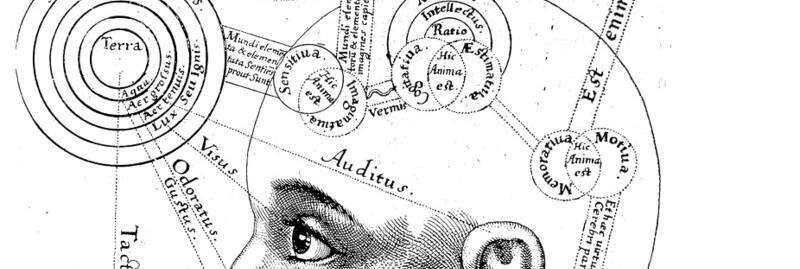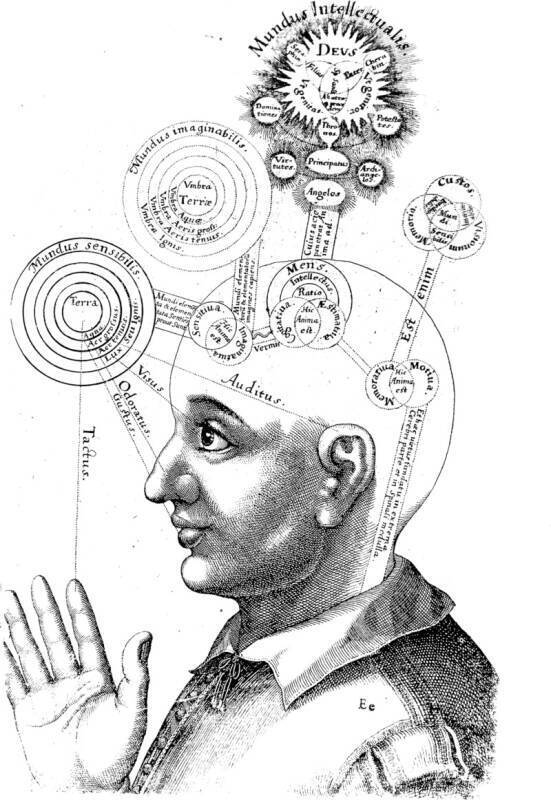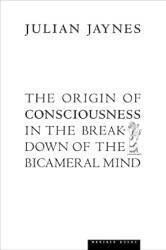
Bob's Blog
Books I've Read:
The Origin of Consciousness
in the Breakdown of the Bicameral Mind
I kept seeing references to this book with its long title, The Origin of Consciousness in the Breakdown of the Bicameral Mind, and now I have finally gotten around to reading it. It was written by Julian Jaynes, a researcher who studied consciousness at Yale (1954–1960) and Princeton (1964–1995).
Joseph Campbell's multi-volume The Masks of God series references it frequently. Roger Penrose's The Emperor's New Mind also references it.
Jaynes' premise is that humans didn't become truly conscious until the second millennium BCE. Until then, everyone had what he describes as a "bicameral mind". There was no introspection. Thoughts, desires, and emotions were auditory hallucinations generated within the right hemisphere of the brain. They were perceived by the left hemisphere and interpreted as the voice of gods giving advice and commands.
Broca's area and Wernicke's area are regions in the left hemisphere of the brain, associated with language production and comprehension, respectively. These "voices of the gods" were generated in the corresponding areas of the right hemisphere and perceived in the left.
Jaynes believed that human consciousness arose during the second millennium BCE. He speculated that the Thira eruption of about 1600 BCE and the Late Bronze Age collapse around the eastern Mediterranean around 1200–1150 BCE drove the change. Societies collapsed, taking away the authority of their religious and governmental leaders, and thus the apparent gods whose directives they were reporting. Ancestor worship was another feature of the "bicameral age", with the hallucinated voices attributed to the honored ancestral dead.

A cognitive model as drawn by Robert Fludd (1574–1637), a prominent English physician known for having a mix of scientific and occult interests. He was an astrologer, mathematician, cosmologist, Qabalist, and Rosicrucian. He wrote large compilations of occult philosophy, and corresponded with Johannes Kepler about scientific and hermetic approaches of knowledge.
The Apparent Proof
Jaynes frequently returns to the Iliad and the Odyssey, attributed to Homer and describing the Trojan War and its immediate aftermath. Jaynes interprets the Iliad as purely pre-conscious, with the Odyssey showing the first signs of self-awareness. He saw a similar difference between the older versus later books of the Hebrew Bible, e.g., Amos versus Ecclesiastes.
According to the theory, prayer, divination, and oracles arose when the bicameral breakdown took away the voices of the gods.
He suggests that the bicameral mind remained in the Americas until the cultures were collapsed by the arrival of the Spanish. However, East Asia, South Asia, and all of Africa are left as a mystery.
The book remains influential.
Jaynes wrote about the auditory hallucinations of
schizophrenic patients being a holdover of,
or even a return to, the bicameral state.
Psychology and neurology
are still exploring some of these ideas.
A recent article in the
Journal of Comparative Neurology
reviews what has been done
to map cognitive models onto human behavior.
Cognitive archaeology, and the psychological
assessment of extinct minds
Phys.org overview
Next:
What is "A.I.", or "Artificial Intelligence"?
So-called "A.I." is hype and misunderstanding, here's hoping the next "A.I. Winter" arrives soon.
Latest:
The Recurring Delusion of Hypercomputation
Hypercomputation is a wished-for magic that simply can't exist given the way that logic and mathematics work. Its purported imminence serves as an excuse for AI promoters.
Previous:
Easy Automation of Thousands of Changes
Use fundamental Linux commands and some shell syntax to make thousands of changes in thousands of files in seconds.
What's Up With My Social Media Postings?
I have an automated Mastodon identity that posts numerous factoids of widely varying relevance. What's going on?.
Why I Abandoned OpenBSD
OpenBSD is technically OK but I won't be involved with, or appear to support, such a toxic environment.
What Does "FIPS" Mean?
People often casually speak of "FIPS compliance", but that could mean multiple things. If it matters — and why else speak of it — we must be careful.
